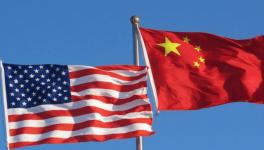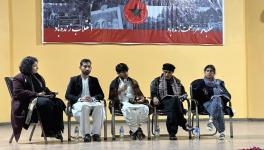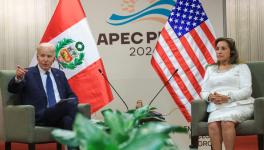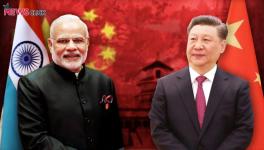LEMOA: India Now Part of US Strategic Pivot to Asia
The LEMOA agreement between India and USA is being termed by the government and its experts as merely a “facilitating agreement” and not a military agreement. Defense Ministry claims that It would be used exclusively for authorized port visits, joint exercises, joint training and disaster relief efforts. But others believe that it is a signal that India is now part of the larger geo-strategic objectives of the US and its pivot to Asia. The purpose of such a pivot is to contain China. The signing of this Logistics Agreement by the Modi government has compromised India's autonomy in foreign policy. With help of this agreement, the US will now be able to access India’s naval and air bases to service the needs of its armed forces.
Image Courtesy: wikimedia.org
Rough Transcript:
Prabir Purkayastha (Prabir): Hello and welcome to Newsclick, this program with The Real News. Today we have with us ,Commander Bhardwaj and we will discuss what has been talked about as the new strategic agreement, the Logistics Exchange Memorandum Agreement with United States. This for India is a first. We never really had this kind of agreement with any country earlier. Did we?
Atul Bhardwaj: First question is that for India it is not the first time that we are getting into such an agreement with the United States because there is a long history which goes back to the second world war when the US had a military base, a proper military base for its far east operations in India.
Prabir: That was not independent India. That was British India.
Atul: These were a lot of concessions at that time it gained they continued post war and even after the post -independence era. For example, in 1949 specifically Nehru signed an agreement with the United States where military aircraft could fly in and out of India without any problems. So this is not the first time that India is getting into such an agreement and to such an extent that the United States embassy had two military aircraft positioned at Palam airport permanently from 1946 onwards t up to 1966.
Prabir: What then stopped the 1966 agreement from going forward and is this something new or is there nothing new in this?
Atul: This is not at new agreement because 1966 primarily stopped because the US started having different aircraft. The navy and the air force then started having a separate kind of logistic airlift command. So automatically, those became redundant and the second issue is at that particular time in the sixties if you see America was quoting China at that time. By seventy one, they were all already close. So they have to distance themselves from India. They were not really interested in India at that time. Now, they are back in India sort of thing. So in that sense, this is different.
Prabir: If you remember Bangladesh issue in seventy one, India and China were really at opposite ends. The US was also sending its seventh fleet it appeared at that point of time and could have intervened militarily in Bangladesh.
Atul: So that was the phase when the US didn't really require India. They were playing a different game with China at that time and you know playing different game with USSR, Soviet Union, in particular. Now, things are very different. Now, the pivot is Asia. At that particular stage, Gulf oil was the main concern. So Pakistan was the biggest ally in that particular game. Now, it is pivot Asia. So their focus is now Asia and within Asia, their focus is primarily China.
Prabir: Containment of China.
Atul: There are a lot of people who say that India has signed this agreement but America has signed such an agreement with a hundred other countries. The fact is that for India, it is a first. But for America, it is the hundredth odd agreement.
Prabir: What is the content of the agreement? A lot of people have said this is really very minimal, nothing major. Yes, there is an issue of optics that India is signing a defense agreement with the United States. But what is significant in terms of the agreement itself?
Atul: The significance is that it brings you closer militarily to one of the biggest military powers in the world. America spends something like 750 billion dollars per year on its defense. If you put the other ten countries, they do not even reach over there.
Prabir: What are the basic terms of this agreement? Are you offering them some refueling and maintenance facilities? Are you offering them some physical bases? What is physically on offer?
Atul: Till now, the government has not actually made the agreement public. Whatever is available is through press reports or through media editorial reports. But by and large the agreement is that India would provide logistic facilities to their fleet or any other air craft, troops or ships coming in and operating from India or for that matter using it as a rest and recuperation place.
Prabir: So they will fly some where rest and go back as they were doing for instance in Thailand during the Vietnam war. Is that what you mean?
Atul: It would probably mean that. At the moment war is not specified in the agreement. What is specified in the agreement is basically for humanitarian disaster relief purposes if say Tsunami comes in , they get their ships there. They may base their ships there. But no operation is going to take place... it's not they just come, refuel and go back. They could also be requiring repair facilities in India. So if they require repair facilities in India, then what happens? An American military logistics if you see has all been outsourced. It has been outsourced to top corporations. For example, Lockheed Martin is involved in military logistics, Day Cop is involved in military logistics. L3, biggest military companies in the world is involved in military logistics. So here you are not talking in terms of the American State coming and interacting. You are talking about large corporations coming in. Now, these large corporations are you know... earlier only our capital budget was going outside. Now, you will see even your revenue budgets will be tapped in by these companies.
Prabir: You are saying apart from the investment in defense industries, this could also mean these companies coming in also in service industries and also acting through Indian partners and trying to take over a part in the defense service budget.
Atul: Yes, we have actually opened our defense service sector to the foreign players.
Prabir: As a consequence of this.?
Atul: As a consequence of this because the US over the last twelve years, some 400 billion dollars these companies have made in overseas bases. Just overseas bases of the United States.
Prabir: The other part of this is purely the optics of it. Optics in politics is a very important element that here is a pivot in Asia as the United States is doing as you talked about, there is a containment of China policy, we talked about earlier in South China Sea and the kind of brinkmanship that the United States is doing in that area. Do you think that this agreement therefore, is also making public that we are now more and more siding with America and therefore, this is a Geo-strategic shift that we are openly making?
Atul: Yes. This is absolutely an open signal that we are now aligned.
Prabir: We haven't done this for a very long time.
Atul: We have never actually overtly said that we are aligned. But, now we are saying that it is like Pakistan getting into CIATO or SENTO pacts in 1950s. So now we are actually becoming a part of the larger game which is happening in the world.
Prabir: So this is a military agreement and therefore, the signal that military alliances are 'in the making'.
Atul: It is a military agreement. You cannot say, when you are talking in terms of bases, they say that it will give India quite a reach outside and India would be able to use them.. The very fact is the costs involved are prohibitive for Indians because Americans when they come here, the agreement says which is out in the open that no customs will be levied on the equipment which comes in. Suppose if the American troops were to be stationed here for some time, if a lot of coco cola and lots of chocolates have to come in, those chocolates will not be bought from India. Those chocolates will actually be flown because they don't trust Indian water. So those chocolates and coco cola will actually be transported directly from America into India and no customs will be charged on it. So there are huge challenges involved in actually assessing this entire agreement. Suppose if India wanted to go --- Russia, India would pay what Americans pay which is in dollar terms. Which is much more. Similar things are going to happen during the exercises. One of the clauses in the agreement is that even during exercises, this agreement will come into play.
Prabir: How do you see this grow? Do you think that this is now getting into a scenario where the issue of China will be seen much more in adversarial terms and essentially, we have now signaled that we are on the other side.
Atul: Yes, this does mark a strategic shift in the sense that now we are now officially aligned.
Prabir: Do you see therefore, when India used to play the role as an Independent player that yes, we had our interests and yes, our interests sometimes you could on certain issues be with China, on certain issues with America, certain issues with Russia, we could take out our self interest as the guiding principle. Do you see this getting therefore, more dragged in to ' the American self interest'?
Atul: Yes because we are basically catering to the American self interest even when we talk about outreach. A lot of people who support the agreement are saying that this will provide us facility to go out into the South China sea where the American bases will help us in terms of our logistic requirements. But the fact is that we have not actually argued what is the purpose for which we will be going. What is it that we will go and achieve? Once your ships go out into the sea, basically one needs to understand how you control. It is not just controlling through 'Chowkidari' (watchman) or controlling just being a watchman in the sea. Basically, you need to control trade. You need to control the channels on which trade flows. Do you have a capacity to underwrite the trade which moves on that channels? You don't.
Prabir: We seem to be also trying to get into relationship of some kind of Vietnam. All of it seems to be now oriented towards China given the fact that we were at one point of time talking about friendship strategic relationship with everybody which is what Modi has discussed with Xi Jinping earlier. This seems to be quite a reversal of policy don't you think?
Atul: It is a reversal of policy it is like I would call, you are trying to go to Vietnam and play it up as if Vietnam is going to be your next what Pakistan is to China. You think you will make Vietnam this. Vietnam is a very different player in the whole game. If you see actually what we are hoping is that, all players will, whether it is Japan, whether it is Korea,whether it is Vietnam, whether it is Philippines, most of these countries actually have a huge grievance against the United States of America. They have all been massive victims of American politics or military over the past fifty, sixty odd years. Japan nuclear bombing. We all know what happened to Vietnam just about forty odd years back.
Prabir: Thank you very much Atul. This has been really a wonderful discussion. We will come back to you with more discussions regarding the Geo-strategic issues that are emerging now in South Asia and also the larger parts of Asia. Thank you very much. This is all the time we have in Newsclick today. Keep watching Newsclick for future episodes.
DISCLAIMER: Please note that transcripts for Newsclick are typed from a recording of the program. Newsclick cannot guarantee their complete accuracy.
Get the latest reports & analysis with people's perspective on Protests, movements & deep analytical videos, discussions of the current affairs in your Telegram app. Subscribe to NewsClick's Telegram channel & get Real-Time updates on stories, as they get published on our website.























